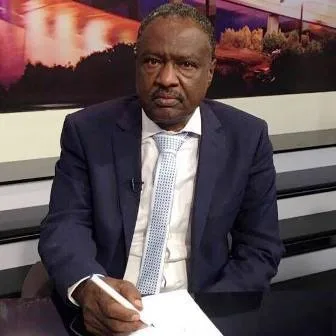Lest We Lose Hope

Rashid Abdel Rahim
We have heard many hopeful tidings from government officials on various issues, even before the Council of Ministers convenes to consider them, review the projects and ideas involved, and issue its resolutions.
We hope that the council meeting, scheduled for the 26th of this month, will mark a prelude to a full and swift transfer to Khartoum.
Let us begin with the symbolism of the oath-taking ceremony held yesterday by a number of ministers, measured against the widespread hopeful discourse surrounding this so-called government of technocrats.
Perhaps the new Minister of Animal Resources distinguished himself as the first Sudanese minister to take the oath wearing a white suit — a choice laden with meaning, given that the ceremony was formal, demanding attire befitting the occasion, which convention dictates should be in the standard colours of black, blue, or grey. A white suit, by contrast, is for social events and private celebrations. Moreover, it was of an old-fashioned style, with six buttons, long since abandoned by its wearers.
This appearance points to the absence of proper state protocol at a significant and historic moment, and conveys an image of a state in undue haste.
We were told that the “Government of Hope” would be composed of people with broad expertise from across the globe, yet the ministers who appeared from within the country wore appropriate and dignified attire, in keeping with the solemnity of the gathering, and refrained from any rash urge to issue premature decrees.
Let us pause again with the Minister of Animal Resources, whose conduct typifies the new ministers’ tendency to make announcements ahead of actual work.
In an interview with journalist Al-Hindi Ezz al-Din, the minister declared that he had a project to establish a free zone for cattle resources in the city of Atbara, given the size of the livestock there. Yet this matter does not fall under his ministry, but rather under the Ministry of Trade. Furthermore, it is the first time we have heard of a free zone being created for a single commodity.
The free zones in Sudanese cities have not been successful; some collapsed before they were even established — as was the case with one in Nyala and another on the western borders with Chad and the Central African Republic.
Meanwhile, the Economic Emergency Committee convened and issued resolutions concerning the gold trade, smuggling, local fees, levies, and other matters.
But all of these issues have already been subject to resolutions and policies that failed to achieve their aims, despite the presence of established state institutions in these areas. The wiser course would have been to avoid hasty measures, await the full convening of the Council of Ministers, and at least work towards eliminating the overlap between the various procedures.
Such resolutions do not need to be “fattened” with further decrees; they require capability and resources. To illustrate, consider the issue of local levies, which fall between the jurisdiction of the federal government, the Ministry of Trade, state governments, and the police. This is a problem that can easily be resolved through a special police unit tasked with dismantling roadside levy points, while holding state officials accountable for defying decisions.
States resort to imposing these fees because they are not receiving the allocations decided for them. The solution lies in paying the central government’s dues to the states, so they will not resort to erecting roadside tents.
The collection of fees on roads is a financial procedure that falls under the Ministry of Finance; the role of the police is to stop such violations, not to collect fees.
Lest we lose hope in this “Government of Hope”, we wish that its ambitions remain realistic — to address accumulated crises in the midst of an ongoing war.
We do not expect it to turn Sudan into a great power. What we want is a homeland whose problems are not insurmountable but solvable, one where citizens can shoulder some of the burden.
Shortlink: https://sudanhorizon.com/?p=7194

